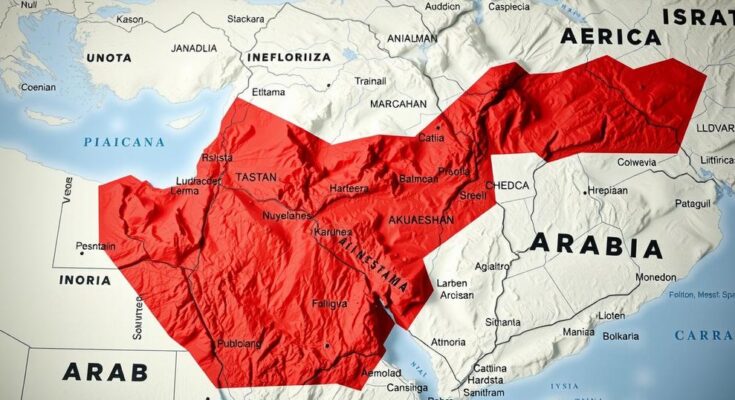Qatar and Jordan have condemned an Israeli map claiming historical rights to territories, including parts of Jordan, Lebanon, and Syria. The map has been criticized as a violation of international law and a threat to peace efforts. Both nations affirm their support for Palestinian rights and sovereignty amidst ongoing regional tensions.
Recent tensions have escalated in the Middle East following the release of a controversial map by the Israeli government. This map, which claims historical territorial rights in occupied Palestine and extends into parts of Jordan, Syria, and Lebanon, has drawn strong condemnation from both Qatar and Jordan. The Israeli Foreign Ministry shared the map on social media, illustrating what they assert to be the ancient boundaries of the Kingdoms of Israel and Judea, purportedly dating back 3,000 years.
The Qatari Foreign Ministry has vocally criticized these claims as a significant violation of international law and resolutions, stating that such maps compromise peace efforts in the region, particularly amidst ongoing conflicts in Gaza. The Ministry called for the international community to act against Israel’s expansionist policies, urging compliance with international legal frameworks. Furthermore, they emphasized that these actions could jeopardize diplomatic efforts for resolution in a region marked by longstanding disputes.
Similarly, Jordan’s Ministry of Foreign Affairs expressed deep disappointment over Israel’s actions, reaffirming Jordan’s commitment to Palestinian rights. Ambassador Dr. Sufian Qudah stated that these developments aim to undermine Palestinian sovereignty and negate their pursuit of an independent state, with East Jerusalem as its capital, in accordance with the July 1967 borders. He condemned the assertions made by Israel, characterizing them as gross violations of international standards and norms.
The underlying issue of this conflict dates back to the 20th century, marked by the establishment of the state of Israel and subsequent territorial disputes in the region. Historical claims made by Israel to ancestral lands have been a source of contention, especially regarding Palestinian rights and sovereignty. The recent map posted by the Israeli Ministry has reignited these tensions, drawing immediate backlash from neighboring Arab states, who view such claims as provocative and potentially harmful to peace efforts. Israel’s ongoing military presence in Palestinian territories and its policy of settlement expansion have faced widespread international condemnation. The historical context of the region, combined with modern geopolitical dynamics, plays a critical role in understanding the ramifications of these developments.
In summary, the publication of the Israeli map claiming extensive historical rights has ignited significant condemnation from both Qatar and Jordan, heightening regional tensions. Both countries view these actions as violations of international law that undermine the prospects for peace and Palestinian sovereignty. The responses from Qatari and Jordanian officials highlight the importance of respecting internationally recognized borders and the urgent need for adherence to peace agreements in the Middle East. As the global community watches closely, it remains crucial for diplomatic efforts to address these compounding issues in a region fraught with complexity and historical grievances.
Original Source: www.palestinechronicle.com




